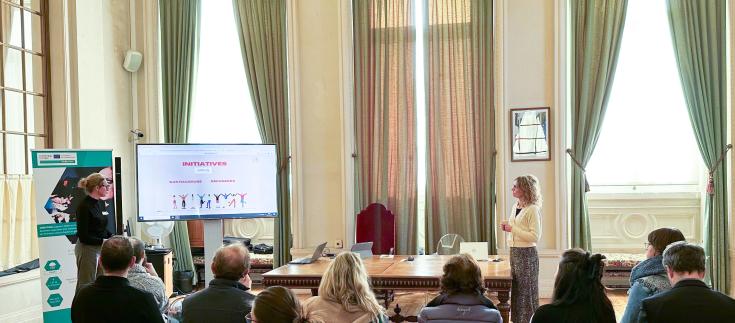Gender at the Core of Responsible Digital, Grand Est, France

Responsible digital initiative brings together professionals to make the digital transformation more inclusive, ethical, collaborative and sustainable. In Grand Est region, France, several organizations are taking action.
One of these is the Hub Est association, led by Alienor Laurent, that organizes events under the name “Numérique en Commun[s] dit ”NEC", accredited by ANCT (Agence Nationale de la Cohésion des Territoires), which mobilize professionals in the digital inclusion, digital mediation and digital sectors for a time of skill-building, inter-knowledge, experience-sharing, mutualization and local meetings.
On December 13, 2024, a day dedicated to “responsible digital” called “NEC Grand Est #2” was held in Reims city. This was an opportunity to reflect on the environmental and societal impact of digital tools from an inclusive approach, on how we can use digital technology more ethically and sustainably, and on how to make citizens more aware of the challenges of responsible digital technology. These themes were addressed through conferences led by experts, roundtables and participative workshops, offering a space for exchange and reflection for players from the Grand Est region.
Another great opportunity to address the challenges of diversity in the digital sector was offered through the DEBUTING project, during the conference "Diversity and Gender Diversity in Access to Digital Tools" that was hosted by Stéphanie Toussaint Beaufey (Grand E-Nov+) and Catherine Mosser (Alsace Digitale). Also the societal context for which we are working was highlighted. Diversity is a driver of innovation and attractiveness: it stimulates creativity, strengthens equality, and promotes personal and professional development. From a young age, through education and training, it is essential to create an inclusive environment. Yet, disparities persist:
- Women remain underrepresented in digital professions: less than 30% of digital jobs are held by women.
- The progression of diversity in tech is increasing by only 1% per year.
- Uses (equipment, stereotypes, domestic responsibilities) still remain unequal.
Fortunately, regional and European initiatives are in place, such as Robotech Girls, Orange Digital House, SAS Hackeuse, Elles Osen en Grand Est, Refugeeks and DEBUTING project. Through these kind of actions change towards more diverse and inclusive digital world is possible.
